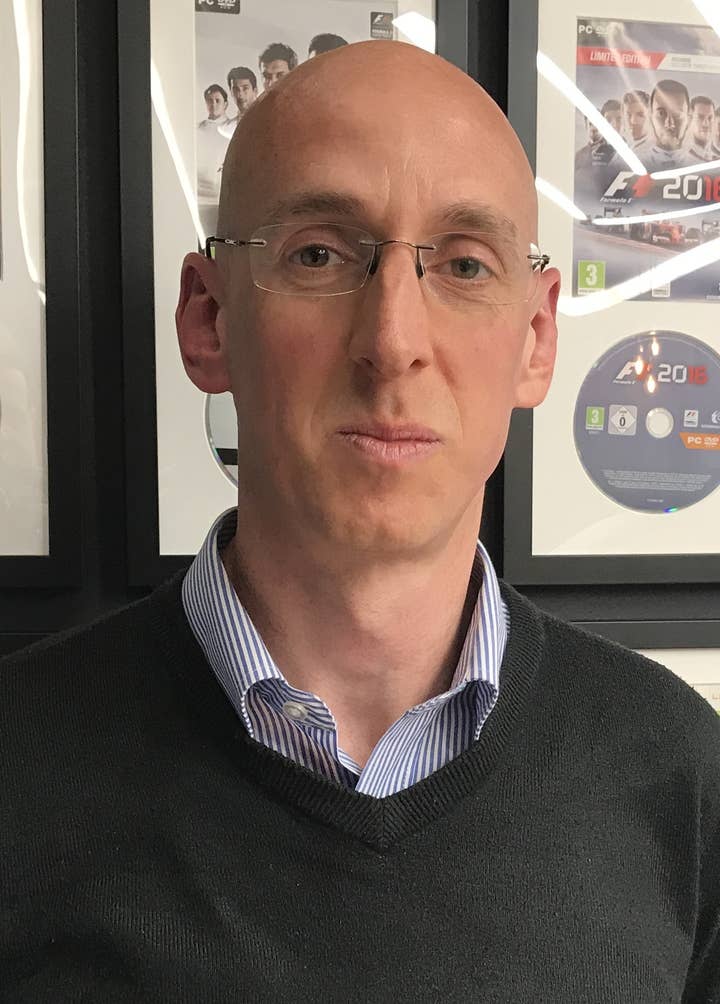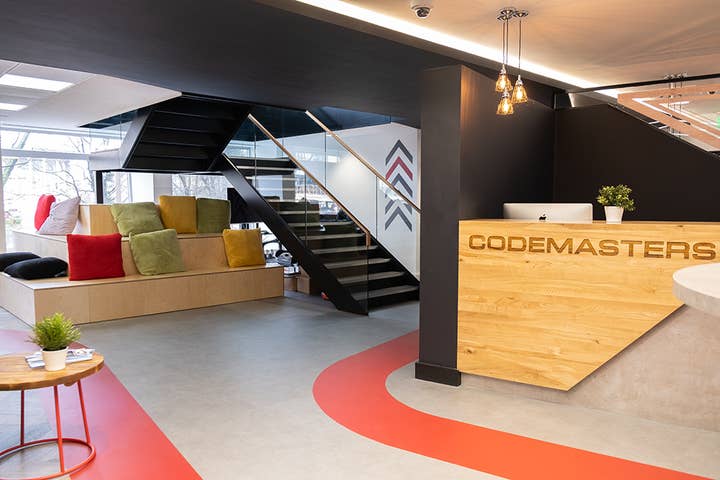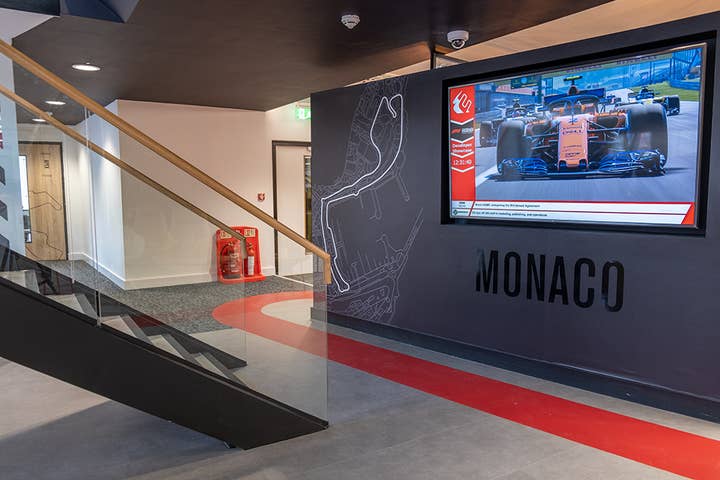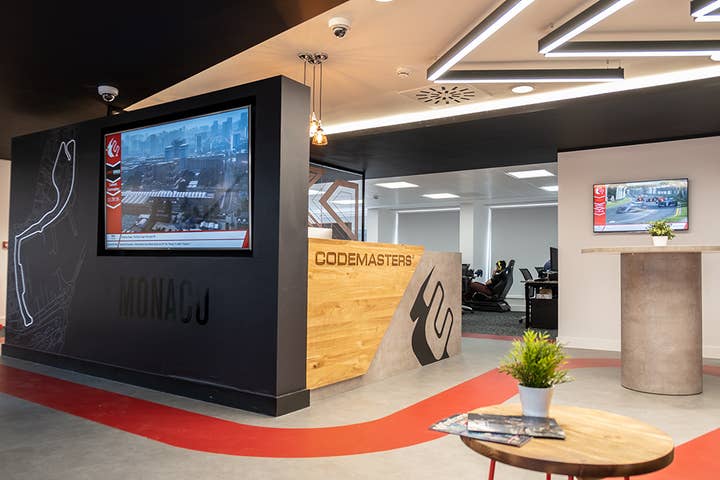Codemasters moves F1 team into new Birmingham studio
Studio head Ian Flatt says new premises allows developer to "recruit even further to expand the franchise"
Codemasters Birmingham has moved into a brand new studio in the city centre, one that will enable the team behind the F1 racing series to not only expand but minimise the pressure faced by so many developers across the industry.
The 14,000 square foot office spans two floors of the newly-constructed Alpha Tower and replaces The Custard Factory where the team spent the past three years. The workforce of 110 moved in a couple of months ago, and GamesIndustry.biz was recently invited to visit the studio.

Head of studio Ian Flatt told us the move was part of efforts to "invest more in the team", adding: "The Custard Factory served a purpose but it wasn't the most salubrious of surroundings, and as we expanded and the F1 franchise was growing, we'd outgrown its capacity.
"The team was doing really well, each game was a big success so the business wanted to reinvest in the team, get us new premises so we could grow the franchise but also reward the effort that has gone in and get people feeling increasingly more proud, recruit even further to expand the franchise."
The new studio's capacity means the F1 team "could easily get to 130 -- probably around 140, if we shove people around" but for now the aim is to reach a headcount of 120, which Flatt hopes to achieve by the end of the year.
In addition to wanting the room to expand, Codemasters was also looking for "an open plan office to negate that friction of working together."
"Ideally, a single-floor plate would have been great but to get something of that scale in the city centre is very difficult," said Flatt. Codemasters Birmingham's solution has been to find two consecutive floors, but build an interior staircase between them to avoid having to use the building's shared elevators.
"When you put in walls and stop people from getting together, you temper some of the creativity"
It was also important to find somewhere in central Birmingham -- some members of the team have been working in the city since they were at the now defunct Rage Software, which opened doors in the mid-'90s. Since Codemasters acquired its successor Swordfish Studios in 2008, the group has always worked in Birmingham, so moving any further out would have run the risk of losing valuable members of the team.
On our tour, Flatt drew particular attention to breakout spaces -- ranging from the canteen to simple groups of comfortable chairs -- as another priority for the new studio.
"These just to make it a nicer place to work, and get some creativity and that spark from people being able to collaborate," he explained. "When you put in walls and stop people from getting together, you temper some of the creativity that can come out of those situations. So we're trying to create a space that makes people get together and try to be as creative as people can be.
He continued: "People need places where they can actually get away from the intensity of the work, have a nice quiet moment, and actually sit down and have a break. Not still having to sit at their desk and, 'Oh, actually I've just seen that email come in so I better get on that', and then you end up working through your lunch. It's about creating those spaces where you can actually take a step back, you can go and stick on a game of FIFA, and get away from the pressure you have during the normal working day."

Of course, working on an annual franchise like F1 means there is always a lingering pressure, but Flatt says by "encouraging people to protect their lunch breaks", Codemasters manages to prevent that pressure from escalating.
"You've got to look after the sustainability, you can't just keep cranking up the pressure and expecting that to go on every year because it's going to make people pop," he said. "You have to be looking at the long game -- we need these people to be more than happy to do four, five, six-plus of these titles and you can only do that by making sure they're looked after and you're not putting on that pressure that's unsustainable to do year after year."
"We need these people to be more than happy to do four, five, six-plus of these titles and you can only do that by making sure they're looked after"
Another feature of the new studio built with this in mind is the presentation space: a large screen facing tiered seating, with more standing room in the open-plan canteen next to it, that allows the company to update its employees on the state of the game.
"There's a lot of cool stuff that's going on, especially when a franchise gets this big, that people don't necessarily see," said Flatt. "There could some really cool videos coming out of marketing and the AI programmer might never see that, but that's something they'd watch and be really motivated by. It's ensuring they're seeing everything, stuff that makes them go back to their desk thinking, 'I'm working on this, it looks amazing, I can't wait for the fans to see that.'
"It's very easy to forget when a project or a franchise becomes so big that everyone only sees their section. You don't want it to be that they only find out what the game's like when you give them a copy at the end. Where's the pride going to be?"
While the studio still has "four or five of us oldies knocking around", Flatt is keen to see what new ideas and approaches fresh blood can bring as they expand. This includes broadening the range of people on his team; in Codemasters' recent Gender Pay Gap report, the entire company's workforce was revealed to be 90% male. Flatt echoed the reports assurances that the company is doing what it can to rectify this, but the lack of viable applicants makes this a challenge.

"That's our biggest problem," he said. "We're very keen here to expand diversity, and we've been going to seminars, events and trying to learn how we can better publicise ourselves to get more female applicants coming in. But we just don't get that volume to be able to make the hires. There's a lot of talk about unconscious bias, but if there's nothing in the pool that's coming in, then there isn't any window to do that.
"We're very keen here to expand diversity... But we just don't get that volume to be able to make the hire"
"I have to say in the last 12 to 18 months, we've interviewed more females than in any period I've ever seen in my career. So we're starting to turn it, but it's going to be a long journey to where we need to be."
The themed decor also reveals a shift in Codemasters Birmingham's remit: it is now dedicated solely to the F1 franchise. While this has represented the bulk of its output for years, there was a smaller second team working on titles like Micro Machines and F1 Race Stars. However, as the franchise has become more popular, more staff have been moved onto F1.
This also increases the studio's ability to advance the franchise. Flatt said developing significant new features is harder to do when working on 12-month iterations, but the new model of a team-and-a-third means a select group of developers are prototyping features for the next title four or five months before the previous one is finished.
This, Flatt said, is the key to growing the F1 games: "We know from our analytics we have a very big playerbase, but they don't necessarily always buy annually. They may only buy every two to three years. We need to make the evolution of each title such that they want to come back and buy every year. If we did that, it would grow sales quite significantly."
He added that the franchise is "going in different directions" with the rise of racing esports bringing in a "huge demographic that wasn't necessarily looking at the franchise before."
Codemasters has invested heavily in the new premises for its Birmingham team, not least because the F1 franchise has become so important to the publisher. As its single annual release every year, Flatt describes the series as the "bedrock" of Codemasters' operations, and one the company can build on.
"We know what F1 is going to do -- it comes out every year and you can make some assumptions on how it's going to perform," he said. "So we can then maybe be a little more creative and take chances with other things. I think the business is built on that. You have your bedrock, your bread and butter, and then you can look at opportunities within the other studios."









